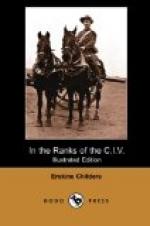September 8.—Henry turned up in a carriage and pair, and we spent all the afternoon together. It is a strange place to meet in after seventeen months, he coming from British Columbia, I from London. A fancy strikes me that it is symbolic of the way in which the whole empire has rallied together for a common end on African soil. He is still very lame, though called convalescent, and we are trying to work his transfer over here. The day-sister has very kindly written a letter to the commanding officer at his camp about it. We compared notes, and found we had enough money to luxuriously watch his carriage standing outside at five shillings an hour. It cost a pound, but it was worth it. We had so much to talk about, that we didn’t know where to begin. A band was playing all the afternoon, and a tea-party going on somewhere, to which Miss Roberts came. She came round the tents also and talked to the men. It turns out that Henry and I both came down from the front on the same day from widely different places, for he was wounded at Belfast, under Buller.
September 9.—Jock gave us a complete concert last night, songs, interspersed with the maddest, most whimsical patter, step-dances, ventriloquism, recitations. He kept us in roars for a long time. Blended with the simplicity of a baby, he has the wisdom of the serpent, and has the knack of getting hold of odd delicacies, with which he regales the ward. He is perfectly well, by the way, but when the doctor comes round he assumes a convincing air of semi-convalescence, and refers darkly to his old wound. The doctor is not in the least taken in, but is indulgent, and not too curious. As soon as his back is turned, Jock is executing a reel in the middle of the ward.
The I.L.H. man is very interesting. Like most of his corps, which was recruited from the Rand, he has a position on a mine there, and must be well over forty. He had been through the Zulu war too. His squadron was with Buller all through the terrible struggle from Colenso to Ladysmith, which they were the first to enter. They were shipped off to the Cape and sent up to relieve Mafeking with Mahon. He has been in scores of fights without a scratch, but now has veldt sores. He says Colenso was by far the worst battle, and the last fortnight before the relief of Ladysmith was a terrible strain. But he spoke very highly of the way Buller fed his men. The harder work they did, the better they fared. (The converse is usually the case.) I have heard the same thing from other fellows; there seem to have been very good commissariat arrangements on that side of the country. From first to last all men who served under Buller seemed to have liked and trusted him. Curiously enough, he says that Ladysmith was in far worse case than Mafeking when relieved. The latter could have held out months longer, he thinks, and they all looked well. In Ladysmith you could have blown any of them over with a puff of air, and the defence was nearly broken down.




